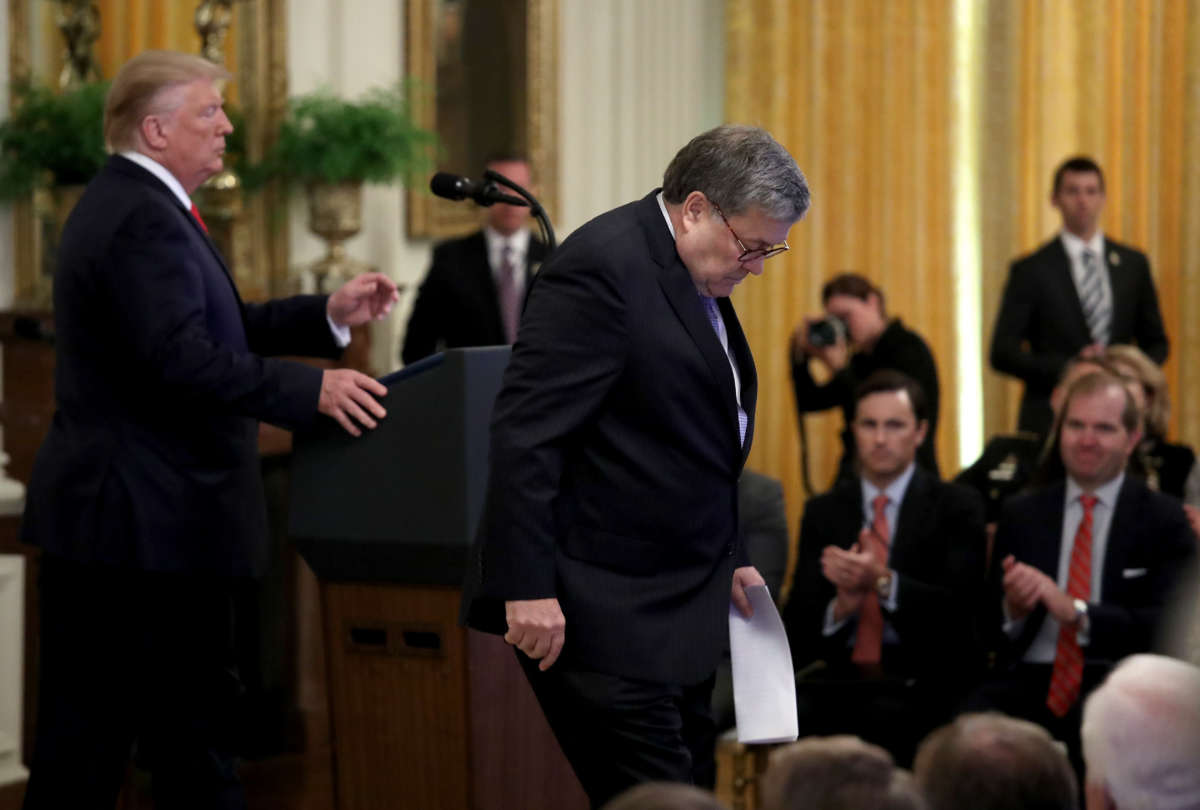An explosive Reuters investigation revealed Friday that a series of executions the Trump administration has planned for next week “will mark the culmination of a three-year campaign to line up a secret supply chain to make and test lethal injection drugs.”
The U.S. Supreme Court on June 29 cleared the way for federal executions to resume when it denied to hear an appeal from death row prisoners challenging the Trump administration’s lethal injection protocol. Inmates Daniel Lewis Lee, Wesley Ira Purkey, and Dustin Lee Honken are set to be killed at a federal facility in Indiana just days apart beginning on July 13, followed by Keith Dwayne Nelson on August 28.
Although it wasn’t until July 2019 when U.S. Attorney General William Barr publicly directed the Bureau of Prisons to resume capital punishment using only the drug pentobarbital—in lieu of a three-drug protocol that had been hampered by supply issues—Reuters reported that “President Donald Trump’s Department of Justice had started building the network of contractors it would need by May 2017.”
A look at how the Trump administration secured a secret supply of execution drugs, despite FDA-approved pharmaceutical companies refusing to sell them to the Department of Justice https://t.co/Xb0JJ4J2e5 pic.twitter.com/QGbHNRnmmP
— Reuters (@Reuters) July 10, 2020
Based on government records and court filings, Reuters detailed steps the administration took before Barr’s announcement to resume federal executions.
In May 2017, the Justice Department reportedly hired the Arizona consulting firm Elite Medical Experts LLC to find “physicians and scientists who could assess whether pentobarbital was a humane method of execution that could replace the three-drug lethal injection protocol used in the last federal execution in 2003.”
According to the news agency:
Since then, [the administration] has pursued a new drug protocol that could survive legal challenges through firms whose identities it has fought to keep hidden. Without the secrecy, the government has argued in court filings, its ability to procure the drugs would be “severely impaired” because the companies are not willing to supply or test execution drugs if they are publicly identified.
The government documents showed that by March 2018, the Justice Department found a compounding pharmacy to make an injectable pentobarbital. By October 2018, the department found a manufacturer of pentobarbital powder, and by February 2019, the manufacturer was producing powder that “passed purity tests,” after initially failing such assessments.
Representatives for all three laboratories that Reuters identified as involved in pentobarbital testing said they were hired by a compounding pharmacy rather than the Justice Department. DynaLabs in St. Louis and ARL Bio Pharma Inc in Oklahoma City also told the news agency they did not know the intended use of the drugs while Eagle Analytical Services Inc. in Houston declined to comment.
A department spokesperson declined to disclose to Reuters any details related to the administration’s efforts to secure drugs for lethal injections.
The death penalty has no place in the United States.
Our federal and state justice systems should not kill anyone for any reason. https://t.co/J0PKY0DWHb
— The Leadership Conference (@civilrightsorg) July 10, 2020
Although the last execution of a federal inmate was in 2003, states that still allow capital punishment have continued to kill inmates the past 17 years, despite also facing barriers to accessing the necessary drugs. Texas, which leads all states in executions, has used pentobarbital alone to kill prisoners in recent years.
As the Associated Press reported in November 2018:
Some past executions have raised questions about the use of pentobarbital. In Texas, an inmate put to death in July cursed twice and said the drug burned his throat. An inmate executed in June started taking quick breaths as the sedative started to take effect, muttering at one point that it was “burning” and that it “hurt.” Before that, a Texas inmate said the drug burned. “Oooh-ee! I can feel that,” he said before slipping into unconsciousness.
Since Barr’s July 2019 announcement, critics have raised concerns about the Trump administration using the drug. As Sam Spital, director of litigation for the NAACP Legal Defense and Educational Fund, told TIME a few days after the attorney general’s order: “Nobody knows if the pentobarbital that the government has obtained will address the serious risks that individuals across the country are facing of being tortured to death through lethal injection.”
4 Days Left: All gifts to Truthout now matched!
From now until the end of the year, all donations to Truthout will be matched dollar for dollar up to $44,000! Thanks to a generous supporter, your one-time gift today will be matched immediately. As well, your monthly donation will be matched for the whole first year, doubling your impact.
We have just 4 days left to raise $44,000 and receive the full match.
This matching gift comes at a critical time. As Trump attempts to silence dissenting voices and oppositional nonprofits, reader support is our best defense against the right-wing agenda.
Help Truthout confront Trump’s fascism in 2026, and have your donation matched now!
